Daughter Asks An Online Community If It's Wrong To Make Her Mom Take Their Newly Adopted Puppy Back To The Shelter
We all know that owning a single dog is a lot of work. But when you add another dog to the mix, it can be a whole new level of challenge – and joy!
For pet owners, life with just one dog can feel like having another child in the house. They need constant attention, love, and (sometimes excessive) amounts of food.
So what happens when you throw another pup into the mix? Let's just say it's never a dull moment.
Two dogs mean twice the amount of slobbery kisses, energy to burn off, and endless entertainment as they play together and drive each other crazy. It also means twice the amount of training and effort required – but trust us, it's all worth it in the end.
Just make sure you have enough space and resources to support both furry friends because owning more than one is a commitment that shouldn't be taken lightly. Remember that it isn't for everyone.
It may be tempting to adopt or rescue multiple dogs, but pet owners need to be realistic about their ability to responsibly care for them. Multidog households require an extra commitment of time, energy, and resources for things like vet visits, training, exercise, grooming, and feeding.
And let's not forget about the additional cost of pet supplies and expenses. Plus, it's important to consider whether all the pets will get along with one another in a crowded living space.
In one Reddit post, a user opened up to the "Am I The A**hole?" about a challenge with a newly adopted dog. She says they already have enough pets at home, and yet her mom brought another adopted puppy home.
Since her mom is always busy and away, she'll end up taking care of the dog, which is unfair considering that she never agreed to this big responsibility.
The original poster and her mom are animal lovers, but there's just one problem.
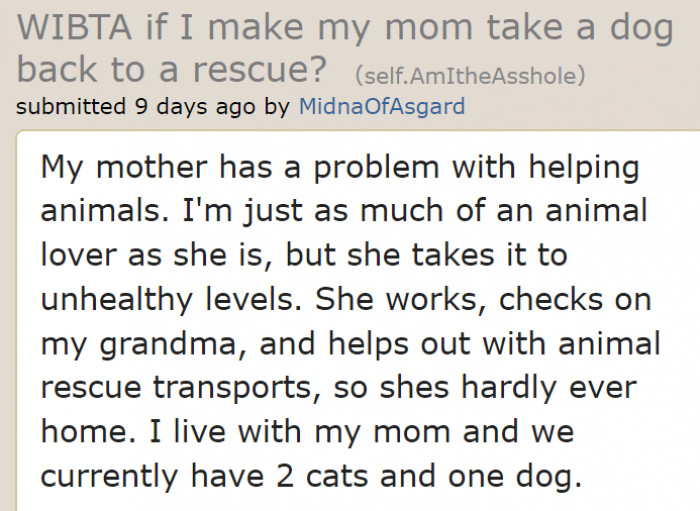
They already have multiple pets at home.
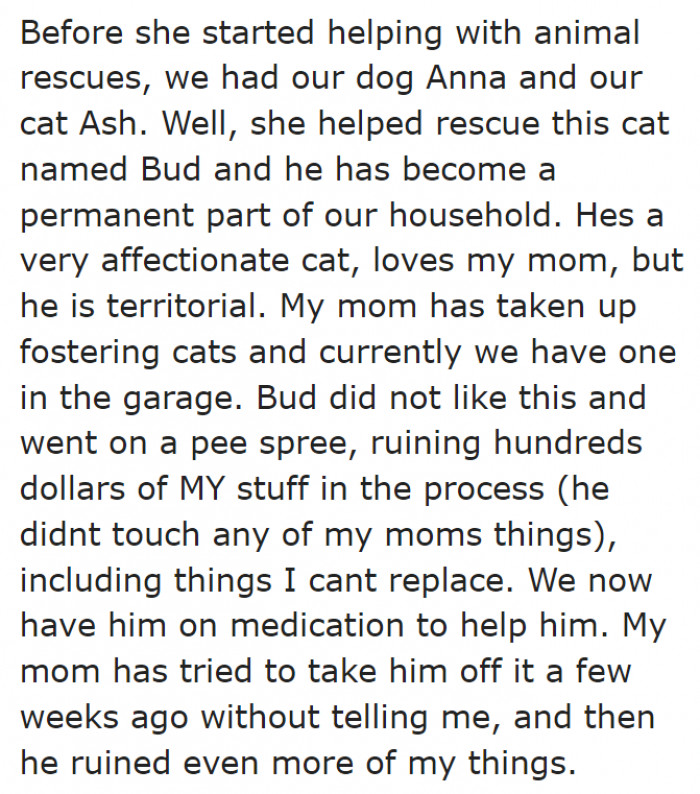
The OP's mom decided to adopt a dog without consulting her.
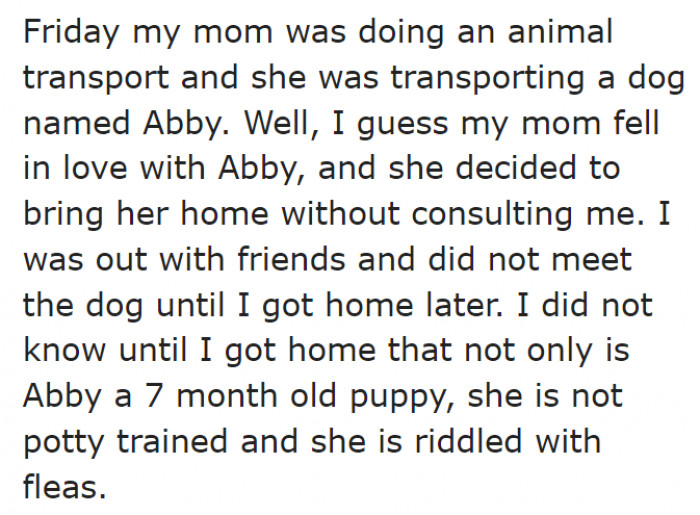
The Emotional Impact of Puppy Adoption
Dr. Michael Adams, a family therapist, notes that adopting a pet, especially a puppy, can significantly impact family dynamics.
Research shows that new pets can bring joy and companionship, but they also require adjustments and commitments that some families may not be prepared for.
Understanding the emotional implications of adopting a pet is crucial for making informed decisions about pet ownership.
The Emotional Toll of Adoption Decisions
Deciding whether to return a newly adopted pet can be emotionally taxing, particularly when family circumstances change. Research indicates that the emotional bond between humans and animals often develops rapidly, making the decision to give up a pet exceptionally difficult. The process of adoption symbolizes hope and new beginnings for many, which can make returning a pet feel like a significant loss.
Moreover, family dynamics play a crucial role in shaping these decisions, as differing opinions about pet ownership can lead to conflicts and emotional distress.
The dog has some problems.

Abby, the newly adopted dog, isn't getting along with the other pets.
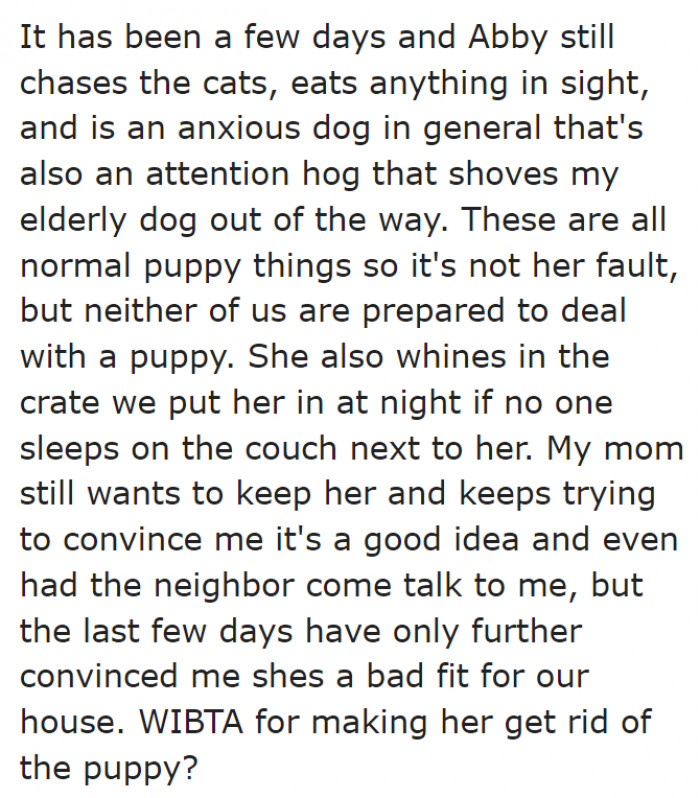
Most Redditors think that the OP's mom is wrong in this situation.
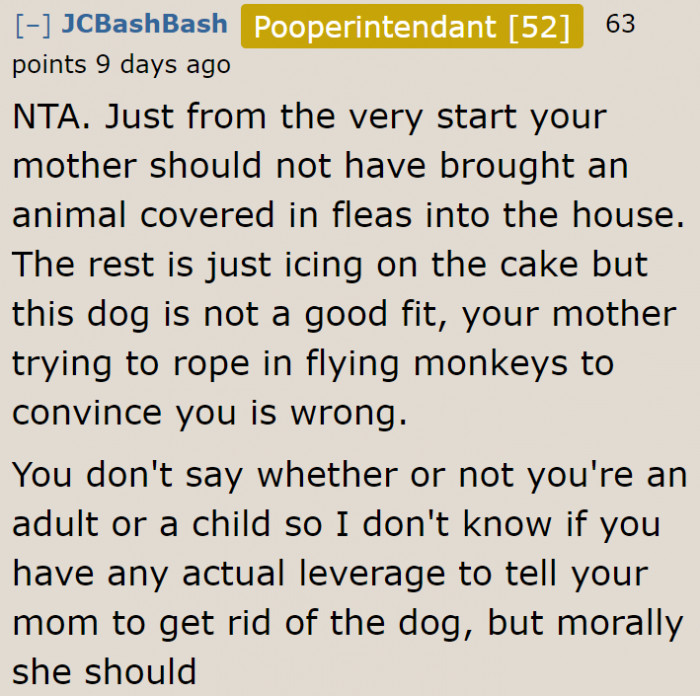
A child psychologist highlights that children often view pets as family members, which can complicate decisions about keeping or returning them.
Studies indicate that children may experience grief and loss similar to that of losing a family member if a pet is returned to a shelter.
Addressing these feelings is essential to support children's emotional well-being during such transitions.
From a psychological perspective, the stress of managing a new pet can exacerbate existing family pressures. Studies suggest that the introduction of a pet can significantly affect family dynamics, especially when the family is already facing challenges. Understanding the emotional implications of adopting a pet is essential for making informed decisions that consider the well-being of both the family and the animal.
The problem is, the mom is super busy. So the responsibility falls on the OP.

Other Redditors think that the mom will do this repeatedly because of her unhealthy love of dogs.

The dog needs a home with humans that will give it the attention it needs.

Communicating About Difficult Decisions
Experts recommend having open discussions as a family about the responsibilities of pet ownership before making decisions.
Involving children in conversations about the challenges and joys of pet care can foster a sense of ownership and responsibility.
It's important to acknowledge everyone's feelings and concerns to create a supportive environment.
The Importance of Open Communication
Engaging in open discussions about the responsibilities and challenges of pet ownership can help families navigate these emotionally charged decisions. Research highlights that fostering an environment where everyone can express their feelings and opinions is crucial for resolving conflicts. By addressing concerns collectively, families can work towards finding a solution that honors both the animal's needs and their own.
Encouraging family meetings to discuss the implications of keeping or returning a pet can help ensure that all voices are heard and respected.
She needs to make her mom realize that adopting another pup is unfair to the other pets.
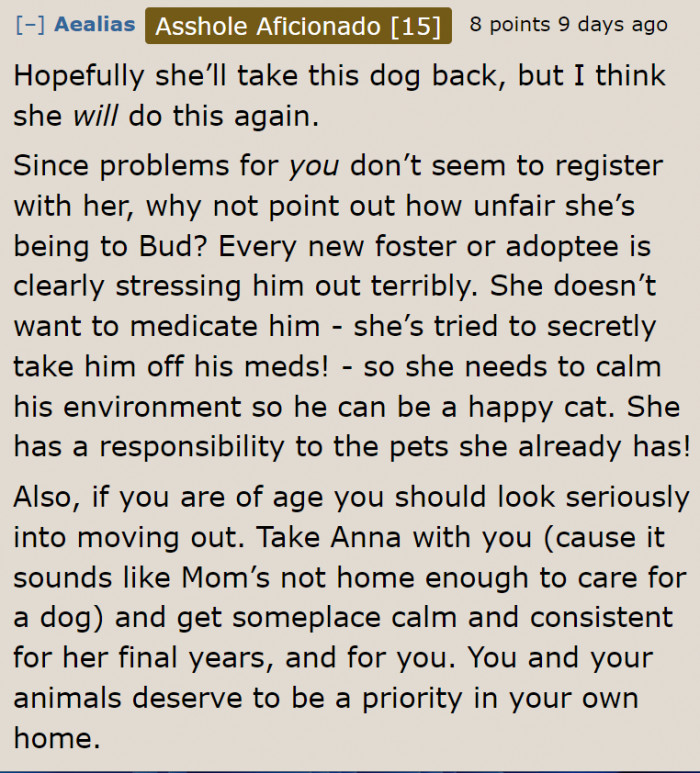
The OP needs to be persistent. It's for the sake of Abby too.
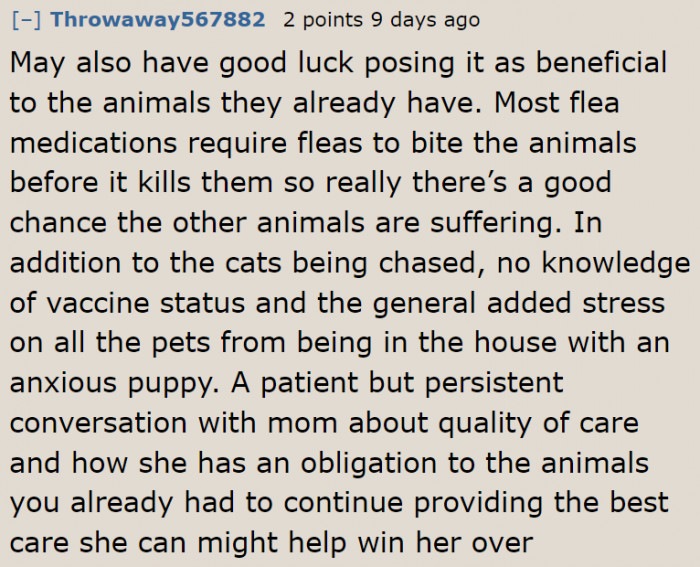
They'll end up neglecting the other needs of their current pets.
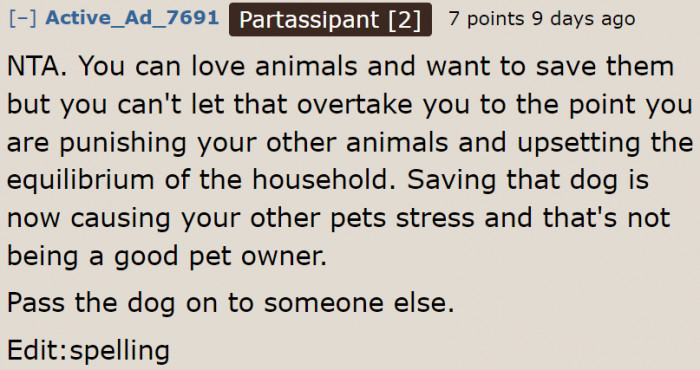
Social psychologists emphasize that family discussions about emotionally charged topics can lead to stronger bonds.
Research indicates that families who communicate openly about their feelings are better equipped to handle conflicts and make collective decisions.
Encouraging family dialogue about pet ownership can enhance emotional resilience and unity.
Additionally, exploring the motivations behind wanting to return a pet can provide valuable insights. Understanding whether the desire to return stems from practical concerns, emotional distress, or conflicts within the family can inform the decision-making process and lead to more compassionate outcomes.
It should be the mom's responsibility to take care of the dog she adopted.
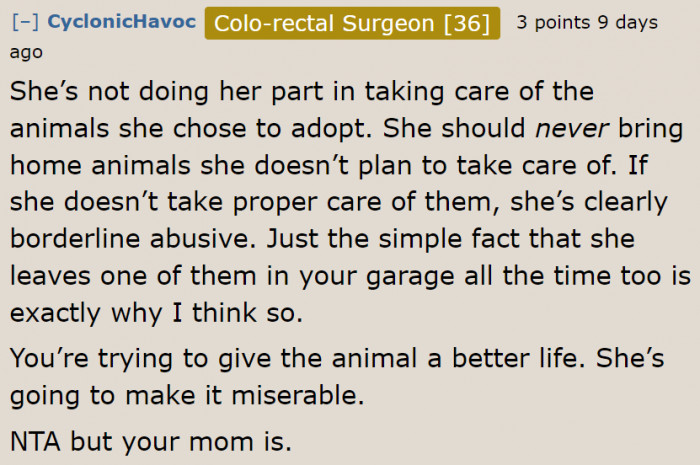
Some Redditors need more info about the OP's situation.
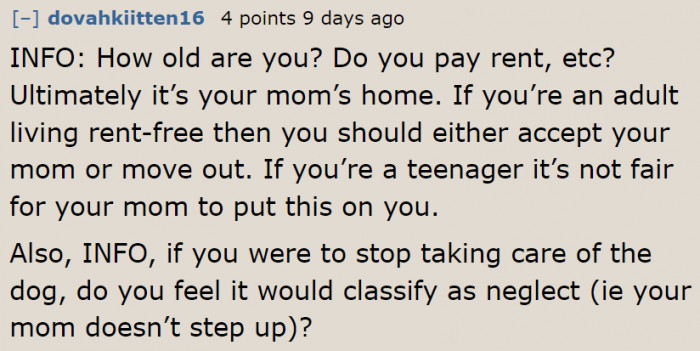
The OP's mom is an animal hoarder.
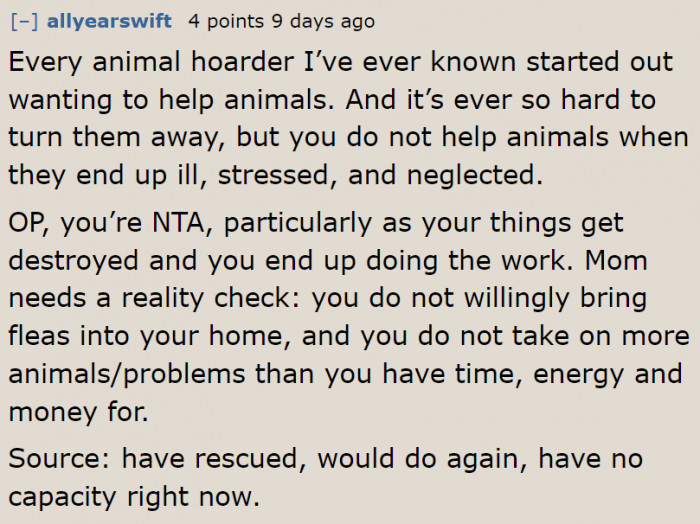
Practical Strategies for Family Discussions
To facilitate decision-making, families can implement structured discussions that outline each member's concerns, feelings, and suggestions. This approach can help create a collaborative environment that promotes understanding and empathy. Utilizing a mediator, such as a family therapist, can also provide valuable support in navigating these emotionally charged conversations.
Ultimately, the goal should be to reach a consensus that respects the emotional needs of all family members while considering the well-being of the pet.
Whether or not it's the OP's home, the mom still shouldn't adopt a pet they can't take care of.

The OP needs to transfer her things to a safer place.
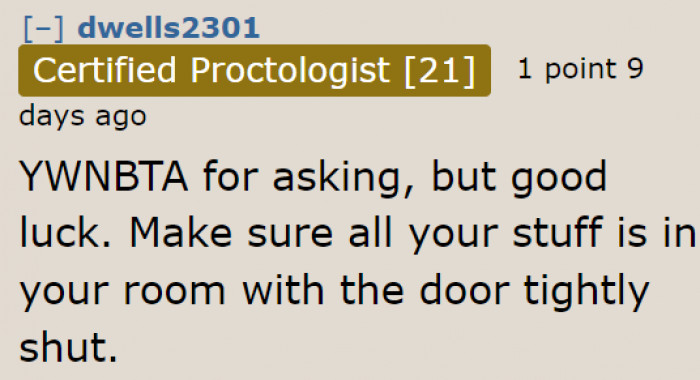
The OP has an impulsive mom indeed.
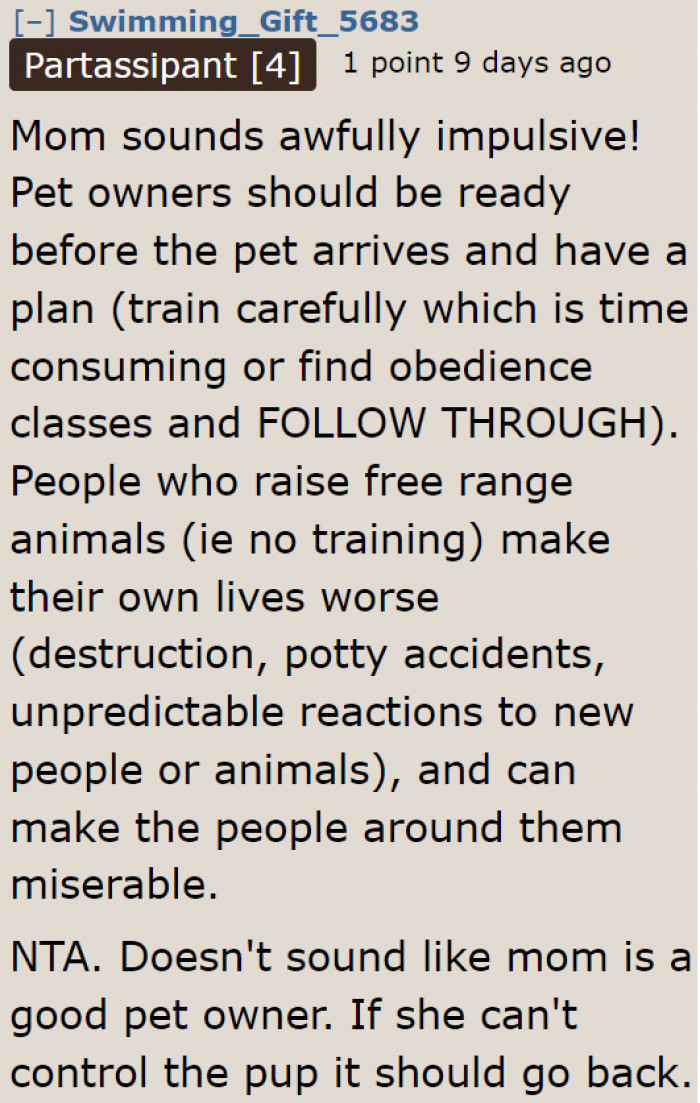
In conclusion, family discussions regarding pet ownership should prioritize emotional well-being and open communication. By fostering a supportive environment, families can navigate the complex emotions surrounding adoption decisions more effectively.
This is so true. There are many humans out there who'll be willing to take care of this dog well.

One Redditor thinks the OP should take care of it anyway.
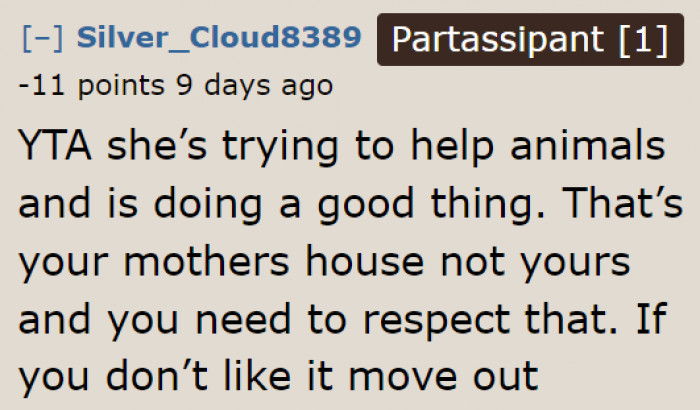
Of course, most people don't agree with taking another animal in with the OP and her mom's situation.
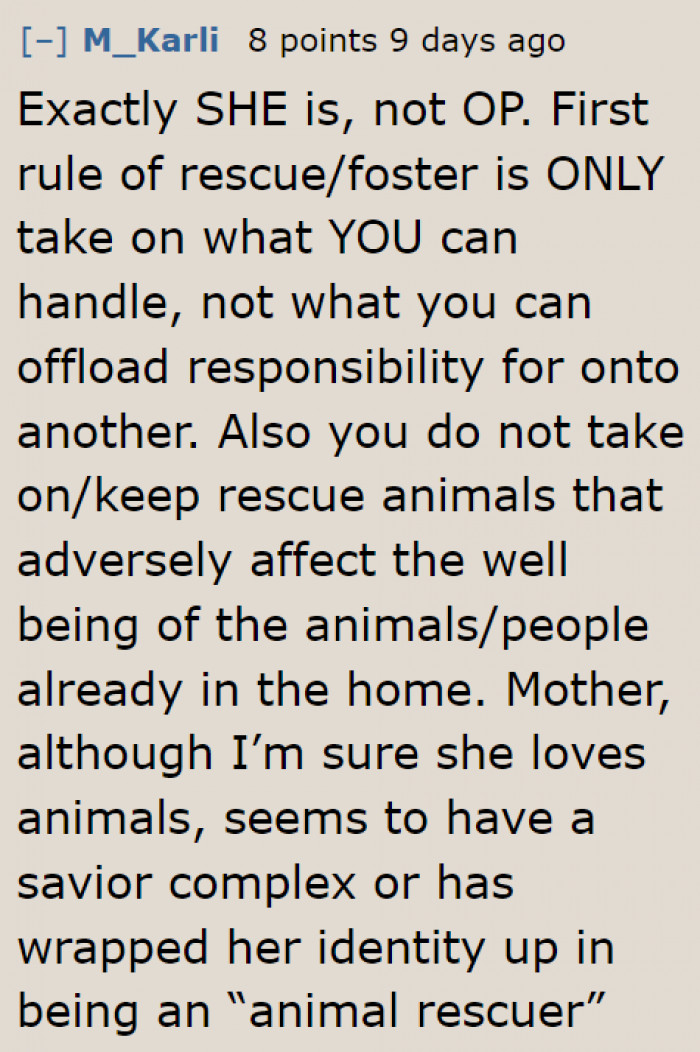
Before bringing home a furry pack, the mom should have considered whether she can truly handle the responsibility and dedication that come with owning multiple dogs. It's not just about providing love and attention; it's also about being prepared for everything else involved in pet care.
Otherwise, both of them (especially the OP) will be overwhelmed or unable to properly care for their current pets.
Psychological Analysis
This situation highlights the emotional complexities involved in pet ownership decisions. The struggle between keeping or returning a pet often reflects deeper family dynamics and emotional needs. Open communication and mutual understanding are essential for navigating these challenging discussions effectively.
Analysis generated by AI
Analysis & Alternative Approaches
In summary, the decision to return a newly adopted pet is laden with emotional complexities that necessitate thoughtful consideration and open dialogue. Families must navigate these discussions with empathy and respect for each other's feelings, ensuring that the well-being of both the animal and family members is prioritized.
Analysis & Alternative Approaches
Decisions about pet ownership can evoke strong emotions and require careful consideration of family dynamics.
According to research from family psychology studies, open communication is key to navigating these challenges successfully.
By fostering understanding and support, families can make informed decisions that honor everyone's feelings, including the emotional needs of the pet.



